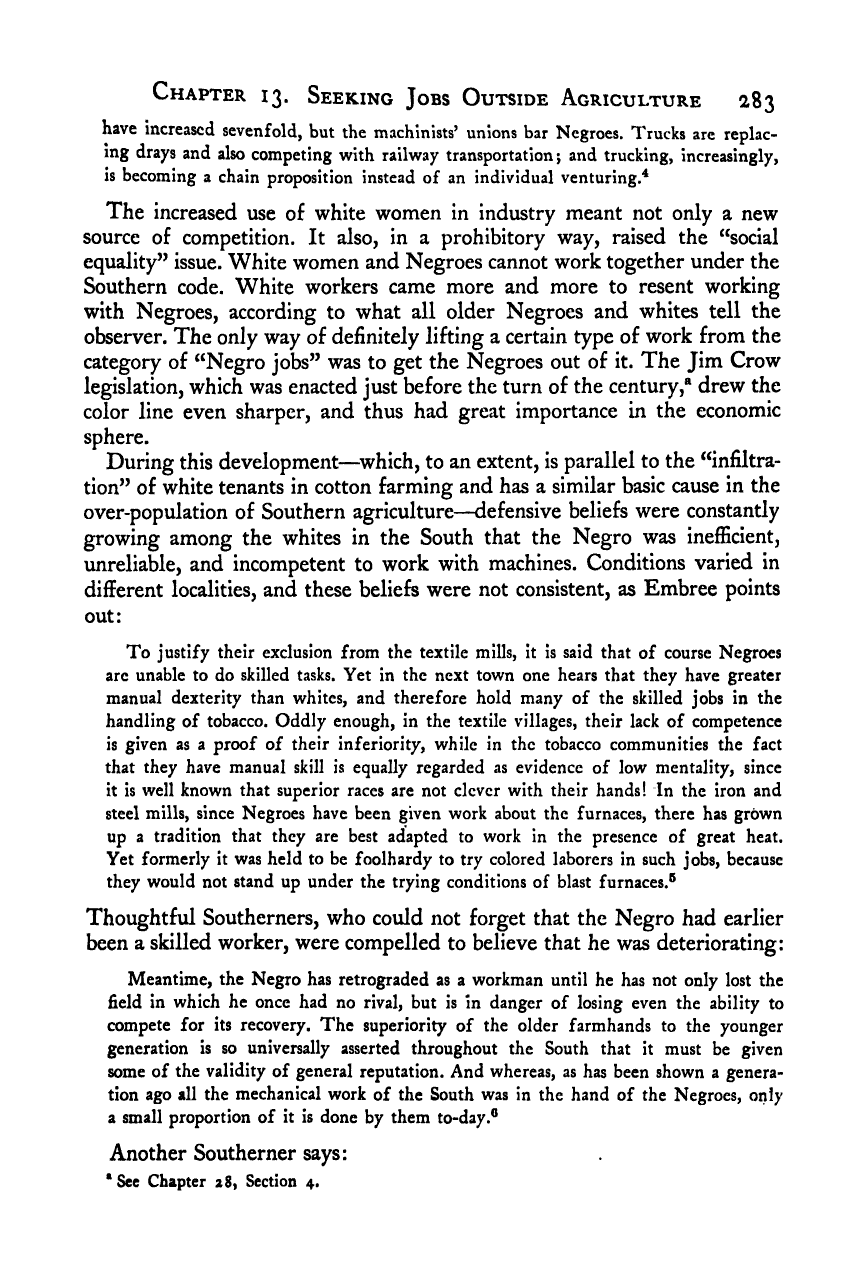Note: Gunnar Myrdal died in 1987, less than 70 years ago. Therefore, this work is protected by copyright, restricting your legal rights to reproduce it. However, you are welcome to view it on screen, as you do now. Read more about copyright.
Full resolution (TIFF) - On this page / på denna sida - IV. Economics - 13. Seeking Jobs Outside Agriculture - 2. In the South

<< prev. page << föreg. sida << >> nästa sida >> next page >>
Below is the raw OCR text
from the above scanned image.
Do you see an error? Proofread the page now!
Här nedan syns maskintolkade texten från faksimilbilden ovan.
Ser du något fel? Korrekturläs sidan nu!
This page has never been proofread. / Denna sida har aldrig korrekturlästs.
Chapter 13, Seeking Jobs Outside Agriculture 283
have increased sevenfold, but the machinists’ unions bar Negroes. Trucks are replac-
ing drays and also competing with railway transportation; and trucking, increasingly,
is becoming a chain proposition instead of an individual venturing."*
The increased use of white women in industry meant not only a new
source of competition. It also, in a prohibitory way, raised the “social
equality” issue. White women and Negroes cannot work together under the
Southern code. White workers came more and more to resent working
with Negroes, according to what all older Negroes and whites tell the
observer. The only way of definitely lifting a certain type of work from the
category of “Negro jobs” was to get the Negroes out of it. The Jim Crow
legislation, which was enacted just before the turn of the century,® drew the
color line even sharper, and thus had great importance in the economic
sphere.
During this development—^which, to an extent, is parallel to the “infiltra-
tion” of white tenants in cotton farming and has a similar basic cause in the
over-population of Southern agriculture—defensive beliefs were constantly
growing among the whites in the South that the Negro was inefficient,
unreliable, and incompetent to work with machines. Conditions varied in
different localities, and these beliefs were not consistent, as Embree points
out:
To justify their exclusion from the textile mills, it is said that of course Negroes
arc unable to do skilled tasks. Yet in the next town one hears that they have greater
manual dexterity than whites, and therefore hold many of the skilled jobs in the
handling of tobacco. Oddly enough, in the textile villages, their lack of competence
is given as a proof of their inferiority, while in the tobacco communities the fact
that they have manual skill is equally regarded as evidence of low mentality, since
it is well known that superior races are not clever with their hands! In the iron and
steel mills, since Negroes have been given work about the furnaces, there has grown
up a tradition that they are best adapted to work in the presence of great heat.
Yet formerly it was held to be foolhardy to try colored laborers in such jobs, because
they would not stand up under the trying conditions of blast furnaces.®
Thoughtful Southerners, who could not forget that the Negro had earlier
been a skilled worker, were compelled to believe that he was deteriorating:
Meantime, the Negro has retrograded as a workman until he has not only lost the
field in which he once had no rival, but is in danger of losing even the ability to
compete for its recovery. The superiority of the older farmhands to the younger
generation is so universally asserted throughout the South that it must be given
some of the validity of general reputation. And whereas, as has been shown a genera-
tion ago all the mechanical work of the South was in the hand of the Negroes, only
a small proportion of it is done by them to-day.®
Another Southerner says:
* See Chapter 28, Section 4.
<< prev. page << föreg. sida << >> nästa sida >> next page >>